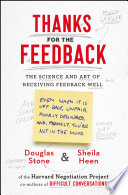

Feedback is essential for personal and professional growth. It serves as a mirror, reflecting our strengths and areas for improvement. The authors emphasize that feedback is not just a tool for performance evaluation but a critical component of the learning process. They argue that seeking feedback proactively can lead to better outcomes in various aspects of life, including work, relationships, and personal development. The book provides insights into how individuals can cultivate a mindset that values feedback and uses it constructively, rather than defensively.
Continue readingThe authors categorize feedback into three types: appreciation, coaching, and evaluation. Appreciation acknowledges what someone is doing well, coaching offers guidance for improvement, and evaluation assesses performance against a standard. Understanding these types helps individuals recognize the different dimensions of feedback and how each serves a unique purpose. By identifying the type of feedback they need or are receiving, individuals can better process it and apply it to their growth. This categorization helps demystify feedback and makes it less intimidating.
Continue readingReceiving feedback is an art that requires openness and a willingness to learn. The authors suggest strategies for receiving feedback effectively, such as asking clarifying questions, avoiding defensiveness, and reflecting on the feedback received. They emphasize the importance of active listening and the need to separate the feedback from personal identity. This approach allows individuals to view feedback as a tool for growth rather than a personal attack, fostering a healthier relationship with feedback.
Continue readingThe book also delves into the responsibilities of those giving feedback. It highlights the importance of being specific, timely, and constructive. The authors provide frameworks for delivering feedback in a way that is helpful, rather than hurtful. They stress the need to focus on behaviors rather than personal traits and to provide actionable suggestions for improvement. This guidance is crucial for leaders and colleagues who want to foster a culture of continuous improvement and support within their teams.
Continue readingMany people struggle with feedback due to fear of rejection, misunderstanding, or past negative experiences. The authors discuss these common challenges and provide strategies to overcome them. They encourage readers to reframe their mindset about feedback, viewing it as an opportunity rather than a threat. By addressing these emotional barriers, individuals can become more resilient and open to receiving and giving feedback, ultimately enhancing their personal and professional relationships.
Continue readingTo truly benefit from feedback, organizations must cultivate a feedback-rich culture. The authors outline strategies for leaders to promote an environment where feedback is welcomed and valued. This includes modeling feedback behavior, encouraging open dialogue, and integrating feedback into regular processes. A feedback-rich culture not only enhances individual performance but also drives team effectiveness and innovation. By prioritizing feedback, organizations can foster a sense of trust and collaboration among employees.
Continue readingSelf-feedback is a critical component of personal development. The authors argue that individuals should engage in self-reflection and self-assessment to complement external feedback. This self-feedback helps individuals understand their own strengths and weaknesses and aligns their personal goals with feedback received from others. The book provides tools and techniques for effective self-assessment, emphasizing that self-awareness is a key driver of growth and success.
Continue readingThe reading time for Thanks for the Feedback depends on the reader's pace. However, this concise book summary covers the 7 key ideas from Thanks for the Feedback, allowing you to quickly understand the main concepts, insights, and practical applications in around 25 min.
Thanks for the Feedback is definitely worth reading. The book covers essential topics including The Importance of Feedback, Types of Feedback, Receiving Feedback Effectively, providing practical insights and actionable advice. Whether you read the full book or our concise summary, Thanks for the Feedback delivers valuable knowledge that can help you improve your understanding and apply these concepts in your personal or professional life.
Thanks for the Feedback was written by Douglas Stone, Sheila Heen.
If you enjoyed Thanks for the Feedback by Douglas Stone, Sheila Heen and want to explore similar topics or deepen your understanding, we highly recommend these related book summaries:
These books cover related themes, complementary concepts, and will help you build upon the knowledge gained from Thanks for the Feedback. Each of these summaries provides concise insights that can further enhance your understanding and practical application of the ideas presented in Thanks for the Feedback.